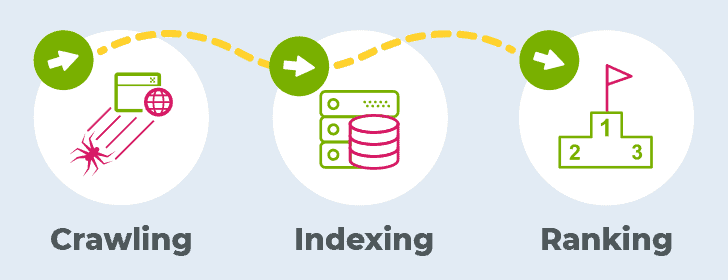Search engines work by using complex algorithms to crawl and index webpages, and then provide relevant results based on user queries. In today’s digital age, the importance of search engines cannot be overstated.
They act as gatekeepers, connecting users to the vast amount of information available online. Search engines are designed to understand user intent and deliver the most useful and accurate results in the quickest time possible. By analyzing factors such as keywords, webpage relevance, inbound links, and user behavior, search engines provide a ranked list of webpages that best match a user’s query.
Understanding how search engines work is crucial for businesses and website owners to optimize their content and improve their online visibility.

Understanding Web Crawling And Indexing
Web crawling and indexing are essential for understanding how search engines work. By systematically scanning and analyzing web pages, search engines create an index, which is then used to retrieve relevant information for search queries. This process enables search engines to deliver accurate and timely search results to users.
Web crawling and indexing are essential processes in how search engines work. In this section, we will delve into the role of web crawlers in search engine operation, how search engines index web pages, and the importance of meta tags and xml sitemaps.
Role Of Web Crawlers In Search Engine Operation
Web crawlers, also known as spiders or bots, are automated programs that browse the internet, moving from one webpage to another. They play a crucial role in gathering information about websites and their content. Here’s what you need to know:
- Web crawlers start by visiting a few webpages, usually referred to as seed urls, which are typically popular or trusted sites. From there, they follow links found on these pages to discover and visit other webpages.
- These bots use algorithms to determine the relevance and importance of each webpage they encounter. They evaluate various factors such as the number and quality of incoming links, the freshness of the content, and the website’s overall authority.
- The primary aim of web crawlers is to collect data in the form of html code from visited webpages. This data is used by search engines to build an index of the web and to note changes or updates to existing webpages.
How Search Engines Index Web Pages
After web crawlers collect the necessary data from webpages, search engines employ a process called indexing. Here’s a breakdown of how it works:
- Indexing involves organizing and storing the collected data in a structured and searchable manner. This allows search engines to quickly retrieve relevant information when a user performs a search query.
- When a webpage is indexed, its content, including text, images, and other media, is analyzed and categorized. This categorization enables search engines to match user queries with the most relevant webpages.
- Search engines use complex algorithms to determine the relevance and ranking of indexed webpages in search results. Factors such as keyword usage, page speed, mobile compatibility, and user experience contribute to a webpage’s ranking.
Importance Of Meta Tags And Xml Sitemaps
Meta tags and xml sitemaps are crucial elements that facilitate the crawling and indexing process. Let’s take a closer look:
- Meta tags provide additional information about a webpage to search engines. They include the page title, description, and keywords. These tags help search engines understand the page’s content and improve its visibility in search results.
- Xml sitemaps act as a roadmap for search engine crawlers, guiding them to relevant pages on a website. This file contains a list of urls and related metadata, helping search engines identify and index webpages efficiently.
Web crawling and indexing are fundamental processes that enable search engines to organize and retrieve relevant information from the vast sea of the internet. Understanding these processes and utilizing meta tags and xml sitemaps effectively can significantly improve website visibility and search engine rankings.
Unveiling The Secrets Of Ranking Algorithms
Uncover the inner workings of search engines and their ranking algorithms to better understand how they deliver results. Gain insights into the intricate mechanisms behind search engine performance and optimization strategies.
Overview Of Ranking Algorithms Used By Search Engines
Search engines use complex ranking algorithms to determine the order in which webpages appear in search results. These algorithms take into account various factors and signals to assess the quality and relevance of a webpage. Here is an overview of how ranking algorithms work:
- Page content evaluation: Search engines analyze the content of webpages to understand what they are about. They consider factors such as keyword usage, semantic relevance, and overall quality of the content.
- On-page optimization: Search engines look for elements like page titles, meta descriptions, heading tags, and url structures to determine the relevance of a webpage to a given search query.
- Relevance and importance: Search engines prioritize relevant webpages that provide valuable information for users. They assess relevance based on factors like keyword relevance, user intent, and the overall context of the search query.
- Backlink analysis: Backlinks are an important signal of a webpage’s authority and credibility. Search engines consider the number, quality, and relevance of backlinks to determine the ranking of webpages. A webpage with high-quality backlinks from authoritative sources is more likely to rank higher in search results.
- User engagement signals: Search engines also analyze user engagement signals like click-through rates, bounce rates, and time spent on page. These signals provide insights into user satisfaction and help search engines determine the usefulness of a webpage.
The Role Of Relevance And Importance In Determining Page Rankings
Relevance and importance play a crucial role in search engine rankings. When users enter a search query, search engines aim to present them with the most relevant and valuable results. Here are the key factors related to relevance and importance in determining page rankings:
- Keyword relevance: Search engines assess how well a webpage matches the keywords used in a search query. Pages with higher keyword relevance are likely to rank higher in search results.
- User intent: Search engines strive to understand the intent behind a user’s search query. They consider the context and purpose of the search to provide the most suitable results. Understanding user intent helps search engines deliver relevant content to satisfy users’ needs.
- Content quality: Search engines evaluate the overall quality of a webpage’s content. Factors such as accuracy, depth, uniqueness, and usefulness determine the quality of content. Pages with high-quality content tend to rank higher in search results.
- Trust and authority: Search engines prioritize webpages with a strong reputation and authority in their respective fields. This is determined by factors such as backlinks from reputable sources, social signals, and overall online presence.
- User satisfaction: Search engines analyze user engagement signals to assess the satisfaction level of users with a webpage. Pages that deliver a positive user experience by providing relevant and valuable information are more likely to rank well.
Understanding the role of relevance and importance enables website owners and content creators to optimize their webpages to meet the criteria set by search engines and improve their chances of ranking higher in search results.
Analyzing The Impact Of Backlinks On Search Engine Rankings
The impact of backlinks on search engine rankings cannot be underestimated. Backlinks are seen as votes of confidence from other websites, indicating that the linked webpage is valuable and trustworthy. Here are some key aspects to consider regarding the impact of backlinks:
- Quality of backlinks: Search engines consider the quality of the websites that link to a webpage. Backlinks from authoritative and reputable websites carry more weight in search engine rankings.
- Relevance of backlinks: The relevance of the websites linking to a webpage is also important. Backlinks from websites related to the content of the linked webpage are considered more valuable by search engines.
- Quantity of backlinks: While quality is a significant factor, search engines also consider the number of backlinks pointing to a webpage. However, the focus should be on acquiring quality backlinks rather than a high quantity of low-quality ones.
- Anchor text: The text used in the anchor link plays a role in determining the relevance of a backlink. Relevant anchor text provides additional context to search engines, helping them understand the content of the linked webpage.
- Natural link profile: Search engines look for a natural link profile, indicating that backlinks have been acquired organically rather than through manipulative tactics. Having a diverse and natural link profile improves the credibility of a webpage.
Understanding the impact of backlinks allows website owners to develop effective link building strategies, focusing on acquiring high-quality and relevant backlinks. This can positively influence search engine rankings and drive organic traffic to their websites.
Decoding User Intent And Search Queries
User intent and search queries play a crucial role in how search engines work. By deciphering the user’s intent behind their search query, search engines can provide more relevant and accurate results, ensuring a better user experience. Understanding user intent helps search engines deliver valuable content to answer their queries effectively.
Understanding User Intent And Its Significance In Search Engine Results:
- The success of a search engine lies in its ability to understand and deliver what users are searching for. This is where user intent comes into play.
- User intent refers to the underlying motive or purpose behind a user’s search query. It is crucial for search engines to decode user intent accurately in order to provide relevant and useful results.
- By deciphering user intent, search engines can better understand the context and meaning behind the search query, helping them deliver highly targeted and personalized results.
- Understanding user intent is vital because search engines seek to provide the most relevant and helpful information to users, ensuring a positive user experience and enhancing their credibility.
How Search Engines Analyze Search Queries To Provide Relevant Results:
- Search engines employ sophisticated algorithms to analyze search queries and match them with the most relevant web pages. Here’s how they do it:
- Keyword analysis: Search engines examine the keywords in a search query and identify their relevance to different web pages.
- Ranking factors: Search engines consider various factors, such as page authority, domain authority, and user signals, to determine the relevance and credibility of web pages.
- User behavior: Search engines also take into account user behavior data, including click-through rates and bounce rates, to gauge the quality and relevance of search results.
- Contextual understanding: Search engines analyze the user’s search history, location, and other contextual data to tailor the search results based on their preferences and needs.
- Machine learning: Search engines utilize machine learning algorithms to continuously improve their understanding of search queries and deliver more accurate results over time.
Read Also What are the Things Required to Do Seo for a Website
The Role Of Semantic Search And Natural Language Processing:
- Semantic search and natural language processing (nlp) play a crucial role in helping search engines better understand user intent and provide more relevant search results.
- Semantic search focuses on deciphering the contextual meaning of search queries and web content, rather than solely relying on matching keywords.
- Nlp enables search engines to understand and interpret natural language as opposed to simply analyzing individual keywords.
- With semantic search and nlp, search engines can better understand the intent behind a user’s search query, leading to improved accuracy and more personalized results.
- By analyzing the context, entities, synonyms, and relationships within the search query and web content, search engines can generate more comprehensive and precise search results, ensuring users find what they are truly looking for.
Frequently Asked Questions On How Do Search Engines Work
Where Do Search Engines Get Their Information?
Search engines get their information from websites by using a process called web crawling. They send out bots, also known as spiders or crawlers, that systematically browse through web pages and index them. These bots follow links from one page to another, collecting information about each page they visit.
The information they gather includes the page’s content, meta tags, urls, and other relevant data. Once the bots have collected the information, it is indexed and stored in a database. When a user enters a search query, the search engine retrieves the most relevant results from this database based on various factors, such as keyword relevance, page authority, and user experience.
It’s important for website owners to optimize their content to make it more discoverable by search engines. This can be done through techniques like keyword research, proper meta tags, and high-quality content creation. Ultimately, search engines aim to provide users with the most relevant and useful information based on their search queries.
How Does Google Search Work Technically?
Google search works by using a complex algorithm that scans billions of web pages to provide users with relevant search results. The process involves crawling, indexing, and ranking. Crawling involves robots, called googlebots, that visit websites and follow links to find new pages.
The information gathered during this process is then added to google’s index, which is like a giant library of web pages. When a user does a search, google’s algorithm quickly analyzes the index to find the pages that match the search query.
The algorithm uses various factors to determine the relevance and ranking of each page, such as the keywords used, site quality, and user experience. The most relevant pages are then displayed in the search results. The goal is to provide users with the most accurate and useful information possible.
How Does A Search Engine Work 3 Steps?
A search engine works in three steps: crawling, indexing, and ranking. First, the search engine sends out web crawlers that browse the internet, discovering and collecting information from various web pages. Then, the collected data goes through indexing, where it is organized and stored in a database.
This process helps the search engine retrieve information quickly when someone enters a search query. Lastly, when a user submits a search query, the search engine uses an algorithm to rank the indexed pages based on their relevance to the query.
The algorithm considers factors like keyword usage, page authority, and user experience to determine the most relevant results, which are then displayed to the user.
Conclusion
Understanding how search engines work is crucial for anyone involved in online marketing. By grasping the essential concepts behind search algorithms, such as crawling, indexing, and ranking, you can optimize your content to increase visibility and drive organic traffic to your website.
Remember to focus on relevant keywords, create high-quality and valuable content, build authoritative backlinks, and ensure your website is easily navigable. Keeping up with the latest trends, updates, and changes in search engine algorithms will also help you stay ahead of the competition.
Ultimately, the better you understand search engines, the more effectively you can tailor your content strategy to meet your target audience’s needs and achieve your online goals. With the right seo strategies in place, you can improve your website’s ranking and establish a strong online presence.
So, start implementing these insights and watch your organic search traffic grow.






